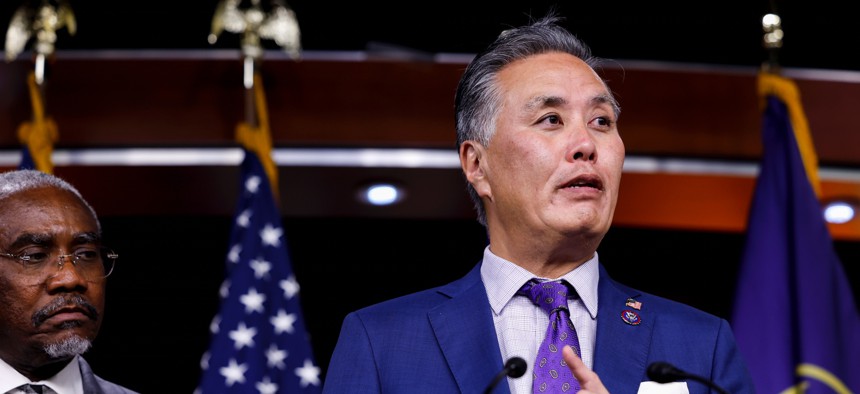
Rep. Mark Takano, D-Calif., has introduced new legislation with Rep. Mike Bost, R-Ill., to provide VA medical professionals with a pathway to seek adjustments for compensation errors. Ann Moneymaker/ Getty Images
Bipartisan bill would let VA medical employees grieve compensation mistakes
Unlike most federal workers, medical professionals at the Veterans Affairs Department are unable to negotiate over compensation adjustments like payroll errors.
A new bipartisan bill from the leaders of the House Veterans Affairs Committee would grant Veterans Affairs Department medical professionals the right to pursue the correction of payroll and other compensation errors through the union grievance process.
Medical professionals like doctors and nurses at the VA are hired under Title 38 of the U.S. Code. Unlike most federal workers, who are hired under Title 5, Title 38 employees have abridged collective bargaining rights, including prohibitions on the ability to negotiate over issues of patient care and clinical competency. It also bars them from engaging in collective bargaining over compensation adjustments.
That means that if the VA makes a mistake affecting Title 38 employees’ paychecks, they are unable to file a union grievance to ensure the department makes them whole.
The VA Correct Compensation Act (H.R. 6538), introduced by Rep. Mark Takano, D-Calif., ranking member of the House Veterans Affairs Committee, and committee Chairman Mike Bost, R-Ill., would create an exception to Title 38’s prohibition on negotiating over compensation adjustments that clarifies that VA medical professionals can file grievances over alleged compensation errors.
“For too long, VA health care staff have struggled to receive these basic compensation rights that would allow them to use union grievance processes when their pay is incorrect,” Takano said in a statement Wednesday. “Currently, many health care professionals are unable to collectively bargain when they experience an underpayment or other payroll error. This bill will hold VA accountable and will ensure VA health care providers receive the compensation to which they are entitled.”
“As a proud former union firefighter, I know the important role unions play in ensuring employees receive their hard-earned salary,” Bost said. “But right now, certain VA health care professionals don’t have the right to grieve an incorrect paycheck. I’m glad to lead the VA Correct Compensation Act alongside my friend, Ranking Member Takano, to do right by VA’s workforce and ensure VA health care professionals would have the collective bargaining rights they have earned when it comes to holding VA accountable to correctly compensate its employees.”
Last Congress, Takano fought unsuccessfully to advance legislation that would have effectively granted VA medical professionals full Title 5 collective bargaining rights, stemming in part from the inability to grieve payroll errors and in part in response to the Trump administration’s maximalist interpretation of the clinical care exception. Despite the reduced scope of this year’s bill, federal employee unions were quick to endorse the measure.
“For more than 30 years, hardworking VA health care providers, including physicians, registered nurses, physician assistants, dentists and more, have lost out on wages due to the VA’s over-broad use of its legal authority, preventing federal unions from ensuring the accuracy of paychecks by remedying routine payroll errors through the grievance process,” said Everett Kelley, national president of the American Federation of Government Employees. “During a time where fully staffing veteran health care facilities remains a top priority for both AFGE and VA, it is imperative that this technical correction is made to ensure that those who care for our veterans are compensated correctly.”
“For decades, VA employees who are classified under Title 38 have had no recourse if their compensation was affected by mistakes in the agency’s payroll processing,” said National Federation of Federal Employees President Randy Erwin. “This means that dedicated registered nurses, physicians, physician assistants, dentists and other professionals are subject to unjust wage losses at no fault of their own, with no way to recoup lost pay. Every VA employee deserves to be fairly compensated for the incredible work they do in caring for America’s veterans.”







